The sudden rise of family churches
[One of the e-generation church models] Exclusive interview with Dr. Yang Changxing of Family Church in Staten Island, New York
Interview team for this publication: Su Wenzhe, Shen Lang, Weng Jingyu
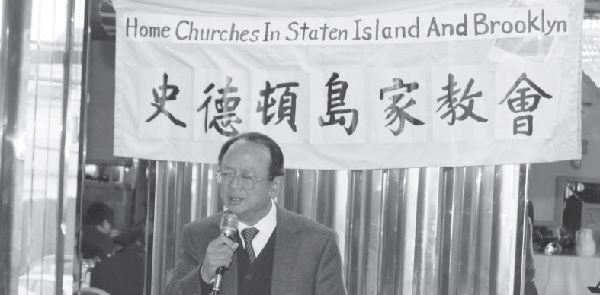
How the church breaks through and transforms has always been a subject of concern and thought for you and me who are willing to serve. Dr. Yang Changxing (pictured above), who has been diligently involved in church service in Staten Island, New York, for more than 30 years, has been deeply reflecting on the church’s operating model. In 2004, he resolutely broke away from the traditional church and actively promoted house churches. This magazine specially interviewed Dr. Yang to share his ideas and practices.
Every Sunday, we go to church to worship. There are dozens to thousands of members in a church worshiping together and listening to the pastor’s sermons. This is probably a pattern that most Christians have accepted after they believe in the Lord. However, in this "naturally justified" model, invisible tensions have become a web that restricts the development of the church─
‧Many churches spend most of their donations on rent, maintenance, building churches, and salaries for clergy and administrative staff. The remaining funds are not enough for missionary work. How can the great commission of evangelism be fulfilled?
‧Because they rely on the donations of the congregation, the speeches of those who donate more often have more weight. Pastors and preachers do not dare to offend the congregation or the board of directors when pastoring, causing deviations in the operation of the church. How can the true word of God be spread in such a church?
‧Because of the blind pursuit of church numbers, some pastors are dissatisfied with being "stealed" by other churches. If such a narrow view of interests is not broken, it will be difficult for churches to unite and cooperate. How can the Kingdom of God grow?
‧Due to the needs of some professions, some doctors, nurses, and caterers must stay at their posts on Sundays. However, not going to Sunday worship is often regarded as ungodly. Who knows about such struggles? Is it not allowed to worship the Lord during the week?
‧Because 20% of the people serve 80% of the people, it is common to hear that co-shepherds and co-shepherds serve until they are physically and mentally broken and unable to take care of their families. Does this please God?
What exactly is the problem? How relevant is it to existing church models? What changes should be made to the existing church model? Where will the church go in the future?
New exploration of church model
We have to admit that a good tradition is a precious heritage of a country and culture, which is the crystallization of the wisdom of our ancestors; similarly, the existing church tradition of Christianity is also a precious wealth of Christianity. According to cultural studies, traditions can be divided into explicit and implicit parts. Explicit traditions include external manifestations such as clothing, food, and rituals; implicit traditions refer to the ideas, meanings, or values hidden beneath the surface. Church tradition can also be divided into explicit and implicit aspects, namely the church model and its connotation.
Without the connotation of implicit tradition, explicit tradition becomes a meaningless empty shelf; for example, under the existing traditional church model, if we forget that winning people is to win souls for the Lord and make lives repentant, we only pursue the growth of the church’s numbers. , then, no matter how many people there are, it will be empty. And many sincerely committed pastors have served for decades, but the church still has not improved, so what should we do? If explicit tradition hinders the spread of the gospel and the growth of the church, or if excessive persistence causes denominations to attack each other and become self-righteous, then the change and future direction of this model will surely become an issue that needs urgent consideration.
Under this situation, many people began to explore and try the e-generation church model. Dr. Yang Changxing from Staten Island, New York, is such a pioneer. In 2004, under the guidance of the Holy Spirit, Dr. Yang Changxing read "The Family that Changes the World: A New Church Structure Toward the 21st Century". In this book, the "family church" model mentioned by the author suddenly made Dr. Yang suddenly understand. After many prayers, consultations, searches, and reflections on service, I decided to put the family church model into practice.
Family church is a model with family as the core concept and more flexible meeting place and time. Dr. Yang believes that whether it is a traditional church or a family church, all church models have their existence. In view of the surging trend of family churches in the United States, he is happy to share the ideas and implementation of the Staten Island Family Church in New York (hereinafter referred to as the Staten Island Family Church).
1. Love feast communication, physical communication
The start time of the meeting is usually set at 7:30 to 8:00 on weekday evenings. Those who come early can participate in a fifteen-minute pre-meeting prayer. Immediately afterwards there is a love feast and physical communication. Because meal time is the most relaxed time, it helps each other open up and communicate about life situations. It can also be used to share testimonies of answered prayers or ask for prayer needs. Come here directly after get off work to have dinner together, which saves time and does not have to go home to cook; one family has one dish, which saves budget; parents are responsible for providing rice, tea or soup, which saves energy and reduces the burden of service.
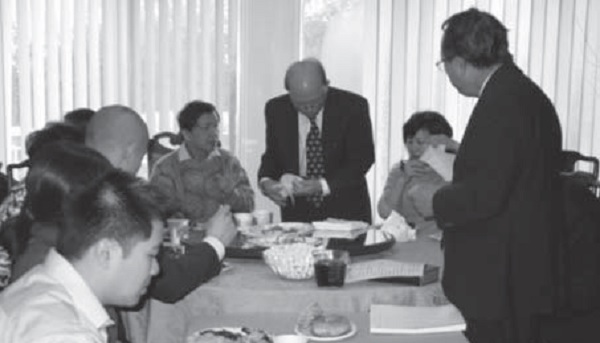
2. Observe the Holy Communion and remember the Lord’s grace
After the love banquet, the Holy Communion ceremony is held immediately, presided over by the parent who leads that day. Holy Communion is observed at every gathering. This is one of the characteristics of the family church. "Do this in remembrance of me." (Refer to 1 Corinthians 11:23-26) The institution of the Holy Communion is to comply with the Lord's command to remind the congregation to remember the death of the Lord Jesus on the cross for us. , inspiring everyone to live more like the Lord, to connect to the Lord Jesus Christ again under the cover of the precious blood, and to have their lives renewed and transformed.
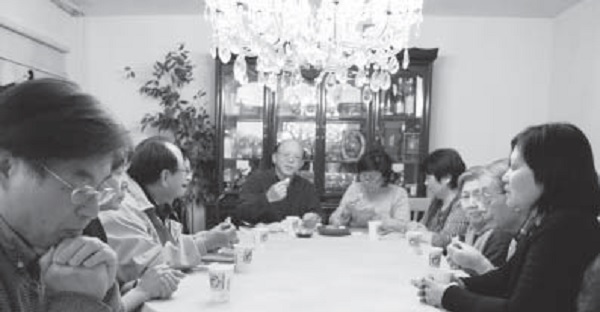
3. Inspired by the Holy Spirit and honest in heart
Worship and praise at 8:30 is the most important time of the gathering. Worship is about experiencing the presence of God, meeting the Lord in spirit, truth, and reverence. Worship in house churches is not limited to specific musical instruments, forms or techniques. It does not matter even if the family in the open space has no musical instrument to accompany it, or even no pianist co-worker. Everyone opens the hymnbook and sings solo, on-call or in unison, standing or sitting. The important thing is to meet God in worship and get close to God with complete release. Anyone who is moved by the Holy Spirit can share the words, revelation or life light given by God.

4. Feed each other and learn from multiple sources
During the information time, excellent spiritual books and gospel programs selected by everyone through discussion will be used for sharing, discussion and self-examination. For example, with the theme of "Building a Family Full of Love," each family will share their current situation at home and review whether they have implemented God's teachings in the past week. What areas need improvement in parent-child and husband-wife relationships? Dr. Yang believes that diversified learning in family churches is more in line with the life needs of brothers and sisters. Feeding each other can avoid the shortcomings of traditional churches where a single pastor preaches, and the information may be monotonous, biased, or lack interaction. Sometimes, they will also invite pastors, preachers or ministry leaders from other places to participate in gatherings to worship God first, communicate in the Lord, and then share ministry. Finally, there were reports and prayers for each other, and everyone received blessings. The meeting ended from 9:30 to 10:00, which lasted about two and a half hours.

5. Joint worship, large-scale festivals
In addition to regular weekly gatherings, several family churches can also unite to hold large-scale gospel festivals on Thanksgiving and Christmas, inviting relatives and friends who have not believed in the Lord to participate. The number of people attending joint worship can be small or large. If it is large, go to a restaurant and book a venue that can accommodate one or two hundred people. As long as everyone's emotions and consensus are gathered, the service methods can be quite diverse.
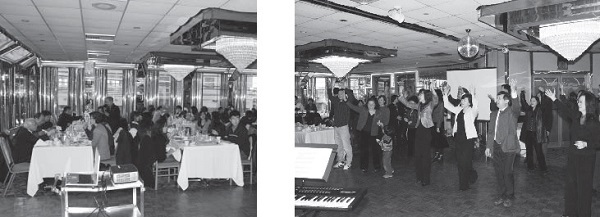
6. Visiting and serving, gospel attack
In addition, family churches can also carry out evangelistic attacks from time to time: or organize visiting services to visit the elderly, care for the poor and sick, or provide community services. Since family churches meet during the week, many community activities held on weekends or Sundays, such as breast cancer prevention walks, can be flexibly participated in, breaking the common impression that Christians do not participate in public activities and increasing the reach of the gospel.

7. Believers are baptized happily
The main purpose of the existence of house churches is to bear the fruit of the gospel. Thank you and praise the Lord! This past Easter, a sister was baptized at the Staten Island family church. This sister's children are all devout Christians and have been praying for their mother for more than ten years. Because of the warmth and love of the family church, my mother was baptized into the name of the Lord Jesus under the witness of Dr. Yang and the brothers and sisters after three meetings.
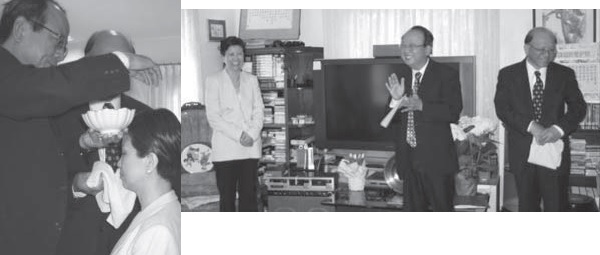
Six characteristics of family education
Compared with traditional churches, the family church model is easier to implement, does not waste resources, and has no restrictions on qualifications and thresholds. The following six characteristics can be summarized:
1. Serving is easy and worry-free
Compared with traditional churches where 20% of co-workers serve 80% of the congregation, the home church model has incomparable advantages. The Staten Island Family Church started its first family church with five families. At that time, three families were willing to open their venues, and the venue owners served as parents and took turns leading the meetings. The advantage of this is to reduce the burden on each family and prevent traditional churches from being unable to enjoy the Lord's presence due to too many single family services or too much burden on small group leaders. If one of the families needs to take a long vacation, the gathering does not have to stop because it can be switched to other open families to support each other.
From the establishment of a house church, brothers and sisters are encouraged to participate in service and grow in service. Because the gathering only consists of a few families, the management is relatively simple; the family church is based on love, the brothers and sisters are familiar with each other, and their lives are integrated with their faith. In this way, 80% of people serve 20% of the people, the service pressure will not be too great, and everyone will be happy to serve. This can avoid the situation in traditional churches where too much service is placed on a few people and the service collapses.
2. Time freely proliferates quickly
The purpose of the existence of family churches is to worship God anytime, anywhere and more freely! Brothers and sisters can decide the time for weekly gatherings based on each other’s work needs and schedules. If an individual needs to work overtime temporarily, he or she can switch to a tutoring session held at a different time. Christians who like to attend meetings or are interested in preaching the gospel can also join two or three house churches, which is quite flexible.
In terms of numbers, the Lord Jesus said:“For wherever two or three are gathered together in my name, there I am in their midst.” (Matthew 18:20)According to the Bible, as long as there are more than two people, a family church can be held. Generally, a family space can accommodate up to eight to twelve people. The method of the Staten Island family church is that every time there are more than fourteen people, the family will be divided into two and then invite new friends (different family churches can negotiate the appropriate number of people). Since 2004, there have been four Staten Island family churches. Each family church has a different situation. One of them has chosen to meet every Monday at 10 a.m. in the food court of a large shopping mall; several retired couples meet for a hike. , enjoy a meal together and gather to worship God!
The e-generation has a fast pace of life, the gap between urban and rural areas has been greatly reduced due to the Internet, and the global village of the world has brought people into close contact. A homely and warm tutor will more easily attract seekers. Compared with traditional churches, family churches have grown and developed faster. When the number of people grows to a certain level, under the leadership and training of the original parent, a new PTA can branch out and start its own gathering. Practicing in the daily service of the family church can help each person to take charge of his or her own role, so that when there is a separation, there will naturally be a suitable parent to take charge. This model is simple and easy to learn. People who are willing to spread the gospel can start a family church after participating a few times. If this proliferation continues, family churches are expected to become a new tool for evangelism in the 21st century.
3. Subtly warm people’s hearts
The family that provides the space for every gathering opens up not just the family, but the entire lifestyle. Their family interactions are completely transparent and open, and such real life testimony affects every brother and sister in a subtle way. The role of a parent is entirely voluntary and not decided by vote. What is important is to have the heart to dedicate your home to God and make your home an altar to God. This can avoid the traditional dilemma of church cell leaders being appointed by pastors who are unintentional or too busy and cannot continue to serve.
In the family church, everyone can share everything from meals to information discussions. This sense of belonging makes every member happy to come continuously, which makes up for the shortcomings of traditional churches that are often neglected due to the large number of people. There is a co-worker who has served in a traditional church for more than ten years and has been addicted to smoking for many years. Later, I followed my wife to the family church, and with the support and prayers of the brothers and sisters, I finally spoke out about the heavy burden in my heart. This brother was encouraged and decided not to use nicotine patches or drugs at all, but to rely solely on God to quit smoking. He would pray as soon as he felt the urge to smoke. He has not smoked for more than three years now (it is generally accepted that six months to two years is considered quitting). Success), and his ability to break through his defenses and bravely face his own weaknesses is due to the open, warm and loving environment of his family.
Dr. Yang also personally led several Christians who had left the church for a long time to return to the presence of God. There is a Christian couple. The husband has not gone to church for a long time because of past hurt experiences in church. Nowadays, I have received the warm and friendly interactive atmosphere of the family church. Now I often come to gatherings and like to have gatherings.
4. The early church is the originator
The traditional church model has a history of more than a thousand years. However, the early church was actually the originator of the house church. In the history of the church, the first chapel was built in 325 AD when Emperor Constantine of Rome declared Christianity as the state religion and took over a pagan temple. The purpose was to ensure that all ordinary people would go out of their homes to gather and start attending church.
However, attending church is not just about gathering in a church building; the most important thing is that a group of reborn and saved Christians are willing to gather together in the name of the Lord to worship anytime, anywhere and in life. Preaching the gospel means worshiping the Lord at any time, place, environment, and number of people, and contacting unbelievers at any time. This is exactly what house churches need to break through and return to the important concepts of the early church!
5. Give freedom with zero expense
PTAs do not have to deal with issues such as church rent, maintenance, church construction, and salary payment for co-workers, and the way of giving is more free. Of course, different family churches must have slightly different approaches to donation. This article only takes the Staten Island Family Church as an example. In order to avoid disputes over the flow of money after a quick separation and reduce the management burden on parents, the Staten Island Family Church itself does not accept donations and never has its own bank account. They call for donations through joint parent worship held every one or two months, and systematically encourage brothers and sisters to donate to places in greater need; in total, only a very small amount is used for brothers and sisters in the home church. More than 95% of the urgent relief provided to friends who seek spiritual help are donated outside the home church.
Take all the missionaries who do the Lord’s work by faith and do not receive a fixed salary (such as an eighty-six-year-old preacher who still diligently preaches and serves the Lord), evangelical organizations that serve the Lord faithfully (such as the True Love Family Association), and Christian cultures with outstanding results Donations can be made to media (such as Kingdom of God Magazine, Good News Radio), emergency aid, social disaster relief, community welfare, or even traditional churches where you have worshiped on Sundays in the past. Brothers and sisters can also recommend suitable units for everyone to donate according to the inspiration of the Holy Spirit.
As for donation receipts, since the Staten Island Family Church does not accept donations, there is naturally no trouble or problem with issuing tax-free receipts. Most of the gospel or charity organizations recommended by parents are legally operating units and will issue official tax-free receipts. However, Dr. Yang particularly emphasized that if the other party is an organization with a lofty vision and a firm mission, or a preacher who lives by faith, even if a tax-free receipt cannot be issued, the Staten Island church will not refuse to donate because of this, which will eliminate the inspiration of the Holy Spirit.
6. Quick decision-making and quick mobilization
Since the number of people in each family is around ten, the decision-making process is quick, which also promotes the efficiency of gospel ministry. Family churches accept the opinions of brothers and sisters and reach consensus through discussion, listening and mutual submission. For example, a sister who is a parent shared on the phone that she had the burden to visit a nursing home. Within a few minutes, everyone immediately gathered people who were similarly moved and prepared to launch a gospel attack. Unlike the traditional church deacons in the past, majority decisions were required due to the large number of people, and discussions were lengthy. In the long run, the ministers spent too much time and energy on minor matters, and in the end they drifted away from the Great Commission.
There is almost no need for parent churches to hold administrative meetings such as trade unions. Instead, they are fully committed to gospel ministry. They can communicate with each other about the current situation of each family, observe and learn, and live in the Lord through parent-only joint worship services every one or two months. Fellowship, sharing and discussion, solving problems, calling for donations and intercession. As soon as the news of the May 12 Wenchuan earthquake in 2008 came out, everyone immediately donated voluntarily. In less than two days, more than two thousand US dollars were transferred to the disaster area through gospel organizations. Because there is no need to go through traditional church meetings to give instructions at all levels, parent churches tend to work more efficiently.
Parent church leader development
Readers may ask, after the rapid expansion of family churches, how to train more qualified parents to meet the growing needs of family churches? Don’t these parents need to have gone to seminary?
The concept of leadership development in family churches mainly comes from following the example of Jesus Christ. The Lord Jesus called his disciples: "Come, follow me." It is precisely for us to learn by doing. A good pastor does not necessarily have to be highly educated, nor does he have to have theological training. There are many ways to learn in family churches. People who want to be parents do not need to go to seminary to take courses. They can directly practice in the service and learn from the Lord in life.
According to a March 29, 2001 Barna poll, more than 40% pastors in the United States have not attended seminary. Pastor Joel Osteen, the author of the best-selling book "Live Better", was not a seminarian; Pastor Yang Shilin did not go to a seminary, but he founded 26 churches, both because he felt the urgency of saving souls. .
"Many preachers are sent to churches after graduating from seminary. They only learn concepts but lack real life experience. It is best to have work experience and serve in a professional capacity first, and then further develop theological equipment." Just as Dr. Yang’s professional experience over the years is, “Only by personally experiencing the pain of illness and empathizing with the suffering of patients can we know how to be a better doctor and understand what help patients need most. Nowadays, medical schools have also realized that the instillation of medical professional knowledge in the past seven years , is not the most effective way to train outstanding doctors. The latest medical education is to allow medical students to participate in internships from the first year of admission, and they often learn more solidly from clinical internships.”
Similarly, theological students must have social experience in order to truly understand the sufferings of the people; otherwise, the consultation and advice given to brothers and sisters will be divorced from reality. What cannot be denied is that everyone who attends seminary has the heart to serve God, but we must get rid of the myth that “to serve God you must have seminary qualifications”; because in favor of imparting knowledge, it is easy to ignore the testimony and example of life. .
In the past, evangelism was passed from one person to another, but now the model of family church is spread; Christians who are truly determined to evangelize can easily learn it. The service training of house churches is more than enough for general evangelism. In fact, the Lord Jesus does not value professionals with good knowledge at all. He values us following Him and learning from daily life to be good disciples, thereby spreading the gospel. .
Many pastors of traditional churches are also called, moved and dedicated by God. They deepen their practical service through "on-the-job training" such as retreats, evangelistic meetings, and Bible lectures. They do not necessarily have to receive several years of theological education. Or specialized training is the most effective pastoral training. Many churches have encountered this problem. In order to meet all the appointment qualifications, they can't find a suitable pastor. What's more, there are not even enough pastors now. Who will take over God's great commission?
So, is it possible for full-time pastors to find space for their own ministry in home churches? What about the salary situation?
Dr. Yang emphasized that the sudden rise of family churches is in line with the trend of the e-era. Traditional churches will still exist and there is no conflict between the two. Some brothers and sisters in Staten Island house churches will still return to traditional churches to attend Sunday services, mainly to fellowship with the extended family of the kingdom of God, celebrate the resurrection of the Lord Jesus or participate in children’s Sunday school, worship groups, etc. Serve one another. Dr. Yang also often attends worship services at his children’s traditional church in Brooklyn on Sundays. Therefore, the pastor or preacher does not lose the space to serve.
"As for the existing preachers, they may wish to support the local house churches and become the "home-based pastors" and "gospel think tanks" of the house churches. Because of their service expertise, when the house church needs it, they can help teach the Bible, participate in visits, and evangelism. Preaching, retreat training, etc. The house church places special emphasis on the absence of full-time pastors, and pastors and preachers can play the role of consultants and achieve the role of alliance.”
There are several pastors and preachers who like to come to the Staten Island house church very much. They all come here because they agree with the concept of the house church. But the method is not like traditional churches, where these clergy simply expound and preach and lead the entire gathering. Instead, we participate in the home church’s worship, prayer, and information sharing together, so that everyone can communicate in the Lord. When these pastors face service needs, the Staten Island family church mobilizes brothers and sisters to donate support instead of providing them with fixed salaries.
The blueprint for the Kingdom of God opens a new chapter
"Traditional churches have Sunday gatherings, but after the proliferation of house churches, due to the flexibility of time, freedom of location, and adaptability to any denomination and church culture, it is expected that every Christian will have the experience of establishing at least one house church in his life. What an exciting picture it is to see a group of people, a group of people who love the Lord, preaching the gospel and worshiping God at any time and anywhere, not just on Sundays!”
This is Dr. Yang’s deepest vision. Pray that God will bless all the pastors and co-workers who are working hard for the Kingdom of God to decide whether to adopt this popular model in the early church under the guidance of the Holy Spirit. I hope this article will trigger your reflection and exploration and create a new situation for the blueprint of the Kingdom of God in the e-generation!
[Dr. Yang Zhangxing’s heartfelt thanks]
Thanks to God’s revelation and guidance, from 2004 to now, many pastors and preachers have provided direct and indirect help to Shengxing at different times and on different occasions: providing history, Bible and other information about home churches, plus Encouragement, suggestions, intercession, blessings and exhortations help the Staten Island family church grow from scratch and grow every day.
The following pastors, family members and brothers and sisters often appear in my heart, and I am extremely grateful:
Pastor Fan Yesheng, Pastor Yang Yongqing, Sister Gao Lili, Pastor Yang Shilin, Pastor Su Wen'an, Mr. and Mrs. Wang Guohua, Pastor Zeng Pingfan, Pastor Chen Zhonghui, Pastor Zhang Yalun, Pastor Adolf Pagliarulo, Guo Yuanping and Teacher Liu Yongling, etc.
Finally, and most importantly, all the family members, brothers and sisters of the Staten Island family church. Without their love and unity to share the joy of worshiping God in life, all of this would be just a theory.
Like God’s Noah’s Ark
House churches not only survived from the New Testament era to the time of Emperor Constantine, but my historical observations also tell me that the body of Christ, the church, was able to truly survive in the dark ages because of house churches. House churches in congregational churches are like God’s Noah’s Ark, allowing the fellowship to never die and the flame of faith to continue burning. ~ "The Home That Changed the World" page 64
biblical house church
Matthew 10:13 “If that house deserves peace, the peace you ask for will come to that house; but if it does not deserve it, the peace you ask for will be yours.”
Luke 10:7 "Stay in that house and eat and drink what they have to offer, for the workman deserves his wages; do not move from one house to another."
Acts 16:32 “So they spoke the word of the Lord to him and to all his household.”
The Holy Spirit descended on a family gathering at Pentecost
Acts 2:2 “And suddenly there came a sound from heaven like a mighty wind, and it filled the house where they were sitting.”
Christians meet regularly at home
Acts 2:46 “Every day they continued with one accord in the temple, and in their homes they broke bread and ate their meals with joy and sincerity of heart.”
1 Timothy 3:15 “But if I tarry long, you may also learn how to conduct yourself in the family of God, which is the church of the living God, the pillar and foundation of the truth.”
~ Pages 81 to 84 of "The Home That Changed the World". Due to limited space, only part of the scriptures are excerpted.
How to solve the problem of lack of leaders
House churches are led by elders, and they are just that: they are older than most people, but they are not necessarily older. Elders are not necessarily teachers with pulpit charisma or profound knowledge. Generally, a humble and reliable father or mother can fill this position competently. They may have believed in the Lord for many years, have mature Christian lives, and have passed various trials in life... They do not have to graduate from a seminary before they can perform religious duties. Such leaders are easy to find and easy to cultivate.
~ "The Home That Changed the World" page 31
【Reference】
‧"Houses that Change the World - A new church structure moving toward the 21st century" (Wolfgang Simson), Yilin, Taipei, 2001
‧“Why Home Churches are Filling Up”, Time Magazine, March 01,2006, http://www.time.com/time/magazine/article/0,9171,1167737-3,00.html
‧"Search for the Right Church Ends at Home", The New York Times, April 29, 2001, http://query.nytimes.com/gst/fullpage.html?res=9C05E2DC1E39F93AA15757C0A9679C8B63

Dr. Yang Chang-hsing was born in the countryside of Zhushan, Nantou, Taiwan. He was raised in a traditional church and is a third-generation Christian. There are nearly 60 people in the family who serve as church ministers and doctors in three generations. He came to American medicine more than 30 years ago and is a nuclear medicine and radiologist. He has been committed to the promotion of the Cancer Prevention Association for many years. Settled in Staten Island, New York, where he served as an elder of the local American church and the Taiwan-English bilingual church and presided over the construction of the church. Decades of service experience and reflection made him increasingly struggle with the limitations of the traditional church model, so he prayed in many ways and began to seek a breakthrough. Brothers and sisters who are interested in learning more about or participating in home churches are welcome to write directly to Dr. Yang. The email is: homechurch@gmail.com


